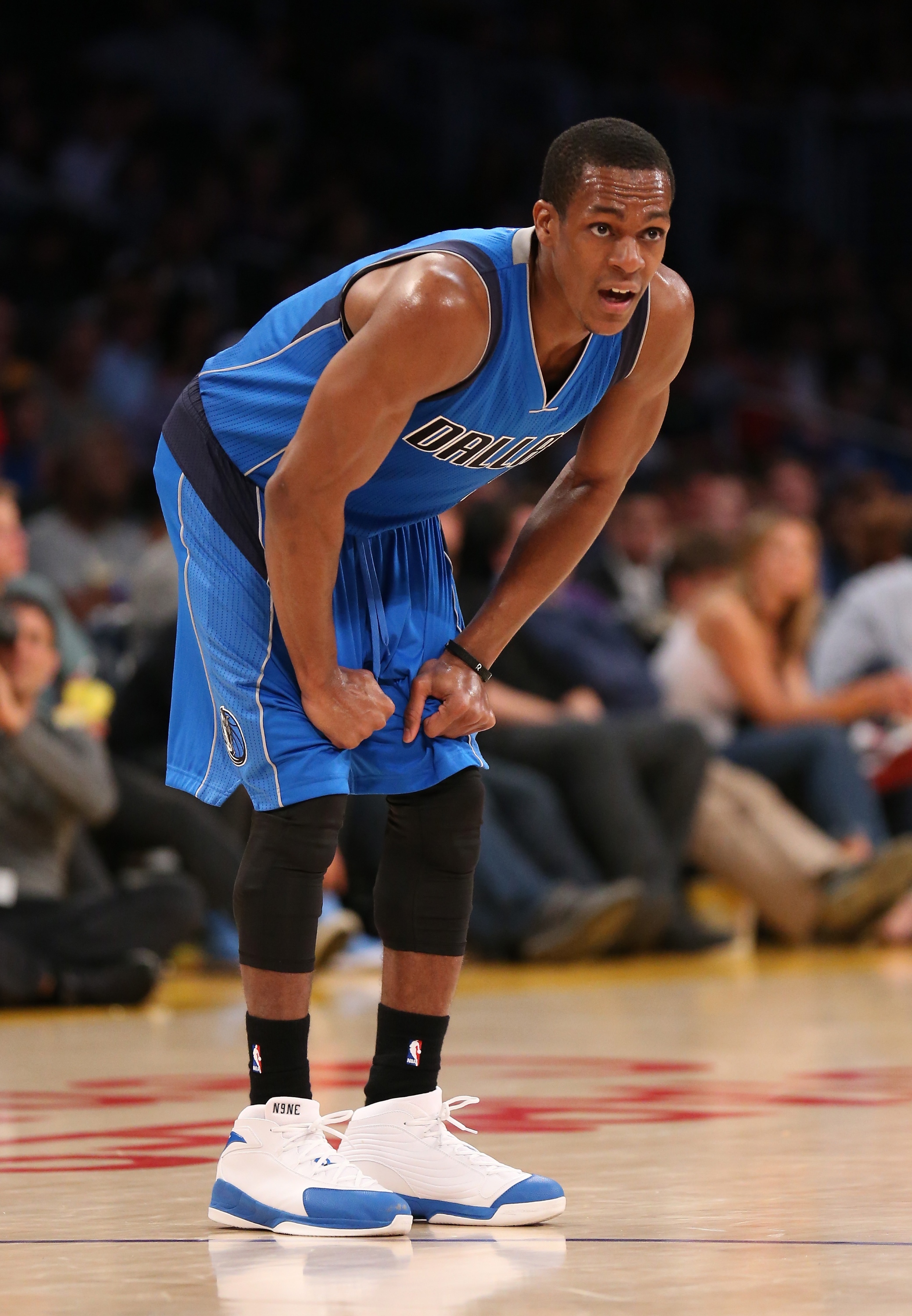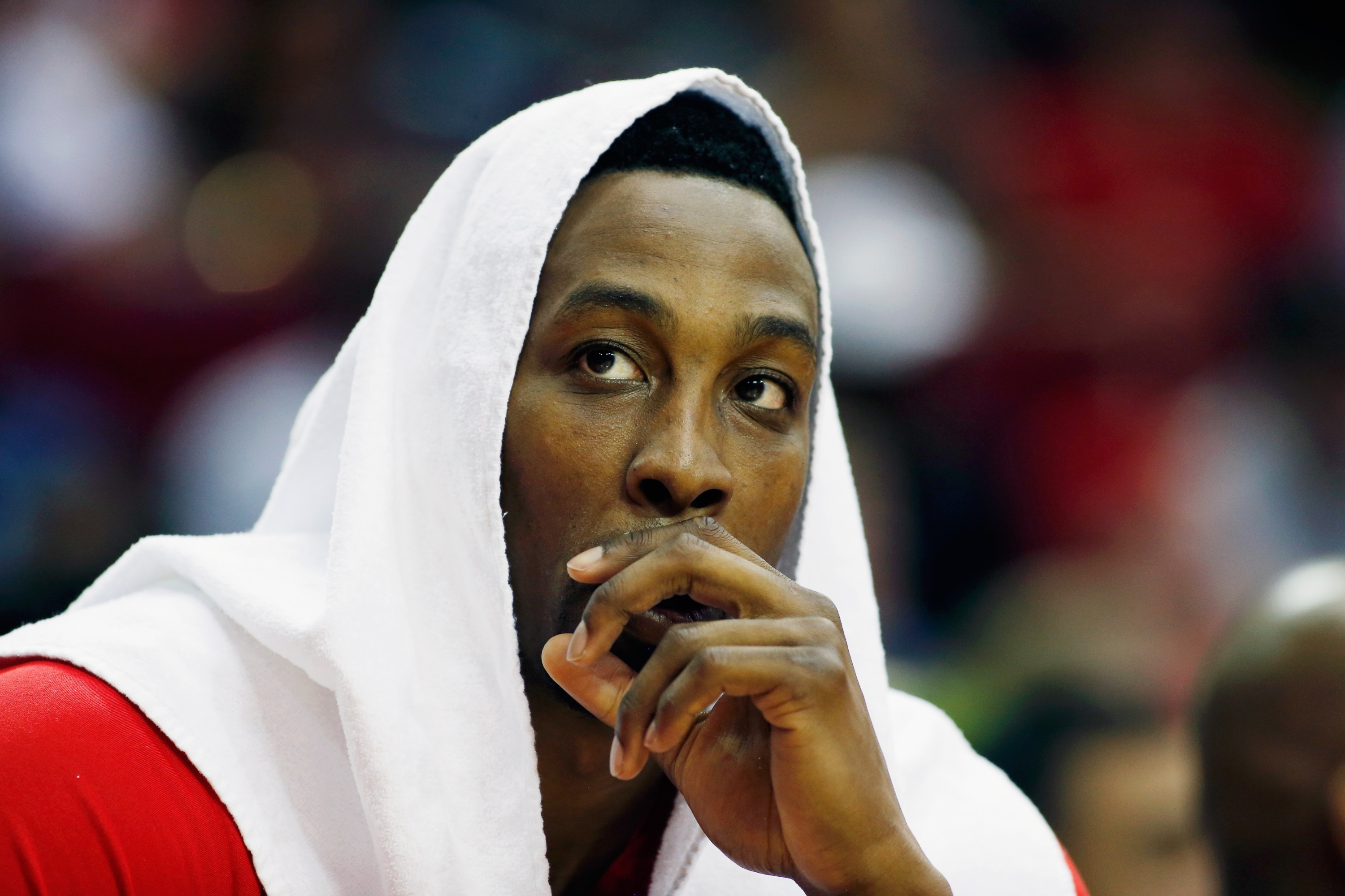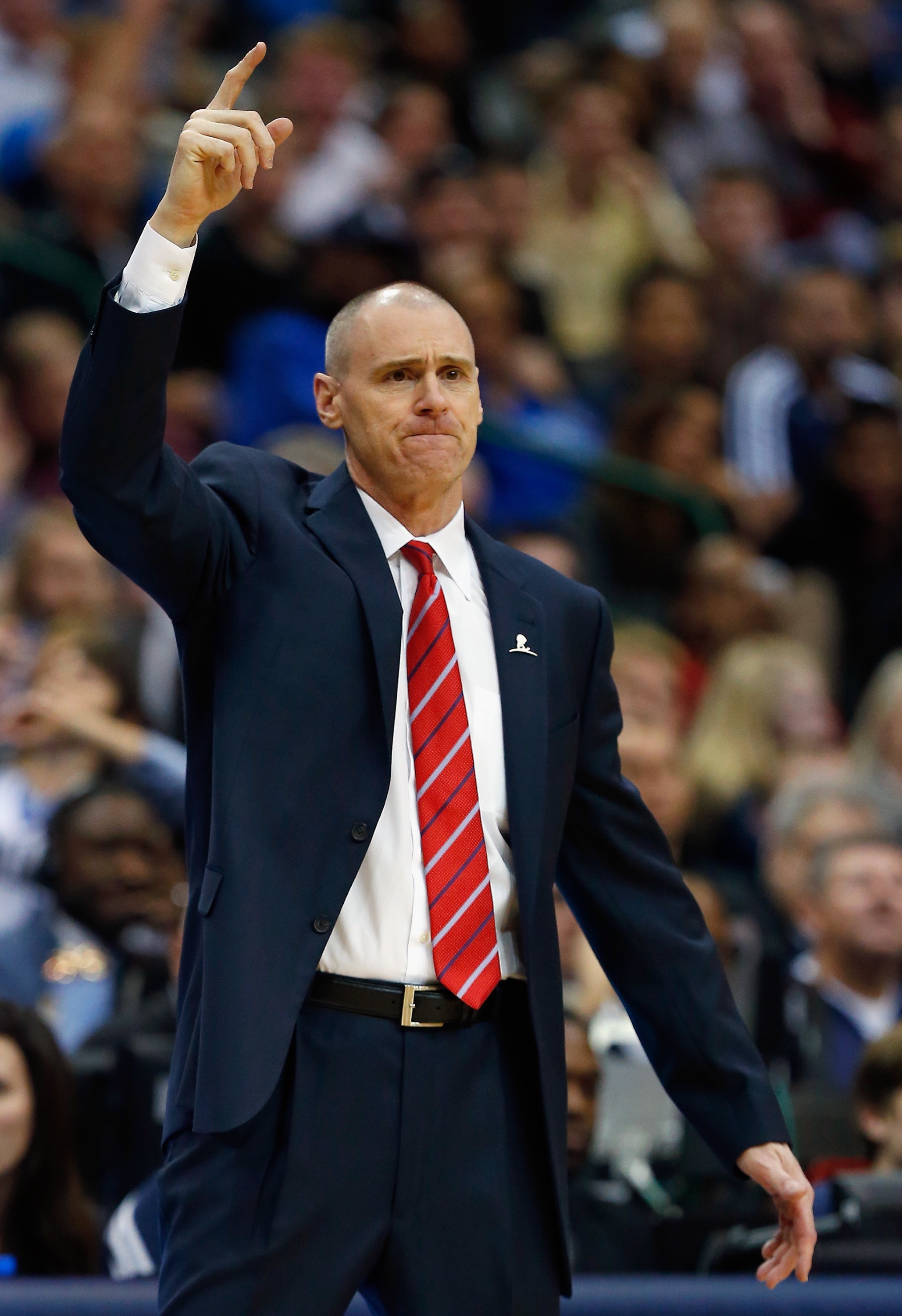BDL’s 2014-15 Playoff Previews: Houston Rockets vs. Dallas Mavericks
How They Got Here
• Houston: There’s no explanation for the Rockets’ No. 2 seed beyond James Harden.
In a virtuoso offensive performance, his 647 made baskets and 565 assists produced precisely 40 percent of Houston’s successful field goals this season. Playing 36.8 minutes a night, he shot 37.5 percent on 555 3-point attempts (top-25 in history) and 86.8 percent on 824 free throw attempts (top-50 in history), leading the league in total points by more than 300, and he still managed to rank sixth in total assists. Harden even upgraded his defense from zero to meh, plucking the NBA’s third-most steals this season, and the end result of it all was a league-high 16.4 win shares.
And his statistics only tell half the story. The Rockets’ entire offense seemingly orbits Harden operating off the dribble — creating his own looks on the perimeter or splitting a double-team, carving his way to the basket and either getting to the rim or sending wild kick-back passes to as many as four awaiting 3-point shooters. Brilliant Houston general manager Daryl Morey has all but removed the statistically ineffective long 2-point shot from his team’s collective mindset, and nobody is more equipped to put his layup-or-spot-up theory into action than the bearded one.
As the body count piled up around him, Harden charged onward, tossing the Rockets over his shoulder and carrying them through the prolonged absences of Dwight Howard and Terrence Jones as well as season-ending injuries to fellow starters Patrick Beverley and Donatas Motiejunas. Morey brought in reinforcements Corey Brewer, Josh Smith, Pablo Prigioni and K.J. McDaniels to help stop the bleeding, and somehow Harden emerged across enemy lines in 56 wins this winter.
• Dallas: With just six wins separating the second seed from the seventh out West, the Mavericks are no less title-worthy than the Rockets, but the roads these Texas teams traveled to arrive at this playoff duel require two vastly different narratives.
After dismantling the 2011 title team, Mark Cuban & Co. completed a massive overhaul around living legend Dirk Nowitzki by signing Monta Ellis in 2013-14, looting Chandler Parsons from Houston this past summer and trading for Rajon Rondo in December. As that dynamic playmaking troika trickled in, Tyson Chandler, Jose Barea and Devin Harris found their way back to Dallas; elder statesmen Richard Jefferson, Charlie Villanueva and Amar’e Stoudemire joined the fray; and coach Rick Carlisle found a 50-win formula for the first time since the championship season.
Rondo’s arrival forged a divide in this Mavericks campaign. Prior to the Dec. 19 trade, they owned the league’s best offensive rating by a significant margin (113.6 points per 100 possessions) and had won 70 percent of their games (19-8). Since then, their 1.04 points per possession drops them to 13th, and they’re 31-24 (.564 win percentage), including a sub-.500 stretch (20-21) from Jan. 7 to April 4.
While the Mavs have been marginally better defensively with Rondo, their 1.04 points allowed per possession still ranks in the lower half of the league. Cuban gambled that a change of scenery would reinvigorate the four-time former All-Star, but the trade depleted a bench that at the time trailed only the Toronto Raptors in net rating. The departures of versatile forward Jae Crowder along with the pick-and-roll combo of Jameer Nelson and Brandan Wright transformed a unit that outscored its opponents by 8.0 points per 100 possessions into a zero-sum operation.
Surely, it was a risk to incorporate a ball-dominant point guard at midseason when the player in question comes with wrinkles that require months of ironing out with coaches and teammates before looking suitable enough for a postseason dance. But all will be forgotten should the Mavericks show up to this series dressed for success.
Head to Head
There is the matter of the Rockets’ 3-1 regular-season series win to attend to, but let’s start from the beginning. Or at least 2013, when Cuban ripped Howard’s choice of Houston over Dallas as “a mistake in judgment.” Morey returned the favor, asking about Nowitzki’s availability to the Mavs owner’s dismay. And then it really got fun once Cuban signed Parsons away from the Rockets for $46 million over three years.
Morey: “The teams that find the Chandler Parsons, not the ones that pay them the max, are the ones that succeed long term.”
Cubes: “Every bit of me wanted to kick [Morey’s] ass.”
Parsons: “It’s cleaner here. It’s just like a nicer, cleaner city. In downtown Houston, there’s not much to do. It’s just businesses, and it’s just kind of dirty.”
Gauntlet. Thrown.
What was that about the regular-season series? Oh, right, Houston sandwiched 95-92 and 99-94 victories around the Rondo trade, and Dallas won the third meeting on the strength of productive reserves Al-Farouq Aminu (17 points, 12 rebounds) and Harris (17 points, 7 assists, 6 rebounds). But with all the injuries and roster moves, the fourth and final meeting — Houston’s 108-101 win in Dallas on April 2 — is most indicative of the lineups we can expect to see when Game 1 tips Saturday night. It’s probably worth noting Harden’s splits against the Mavs (24.8 points, 6.0 rebounds and 5.8 assists) are a hair below his season averages (27.4-5.7-7.0).
Likely Starting Lineups
For Houston, Harden, obviously, operates alongside Howard, Jones, playoff-tested mercenary Trevor Ariza and former Mavericks star turned veteran journeyman Jason Terry in a starting five that has evolved more than Blinky the three-eyed fish.
That quintet has only played 85 minutes together all season, but in that limited sample size, the Rockets have outscored opponents by 15.4 points per 100 possessions and posted an 8-2 record in games featuring their current starting five.
With Smith and Brewer replacing Howard and Ariza, Houston has proven equally effective in short stints. So, Rockets coach Kevin McHale has the luxury of playing either Howard or Smith as a defensive anchor in big and small lineups, respectively, while Harden manufactures the offense with Houston’s hoard of 3-point threats.
For Dallas, there’s Rondo, Ellis, Parsons, Nowitzki and Chandler — a starting five that on paper should wreak havoc on the offensive end, even against Houston’s top-10 defensive unit. But the NBA and fantasy basketball are two different games.
Chandler averaged a double-double, while Rondo has a trio of scoring threats at his disposal in Ellis (18.9 points per game), Nowitzki (17.3 ppg) and Parsons (15.7 ppg). Yet, that group has been outscored by 3.8 points per 100 possessions in 455 minutes over 31 games, a drastic drop-off from when Nelson played the point in the same lineup and helped outscore opponents by 12.9 points per 100 possessions in 254 minutes over 21 games. Even Harris has been better than Rondo with those other four (plus-11.0 points per 100 possessions in 138 minutes over 32 games).
While Aminu has been a blessing off the bench, especially at the league’s minimum salary, the Mavericks cannot ground the Rockets with their starting lineup operating at a deficit for 15 minutes a night. Yet, there is hope Dallas has begun to iron out its issues, as the starters have scored 122.7 points and outscored their opponents by almost 30 points per 100 possessions over the team’s last 10 games.
Matchups to Watch
• Harnessing Harden: In theory, you stop Harden, and you stop the Rockets. In theory. In practice, the Mavericks have actually done a decent job limiting his impact, as lineups featuring Harden have played Dallas to a relative standstill in their four meetings (opposed to his positive plus/minus of 335 for the season). If Stephen Curry wins the MVP over Harden, he is no less deserving of the award, but he can rage against the machine by eliminating his team’s rival in the first round.
• Playoff Rondo: Regardless of how you feel about the mercurial point guard’s performance since his season-ending knee injury in 2012-13, Playoff Rondo is a thing, and it’s one we haven’t witnessed since he averaged 20.9 points, 11.3 assists and 6.9 rebounds for the Celtics in a seven-game Eastern Conference finals loss to the Miami Heat. That run included a 44-10-8 effort in which he was the best player on the floor opposite LeBron James. Rondo shines when the lights are brightest, and the fact he played his best game in a Mavs uniform (29-5-6) upon returning to Boston for the first time since the trade suggests Playoff Rondo is still lurking.
• Howard vs. Chandler: For a period of five consecutive years, either Howard or Chandler manned the First Team All-Defensive center spot, and the two split Defensive Player of the Year honors in four straight years (Howard 2009-11; Chandler 2012). Neither is particularly skilled offensively, but they’re both capable of keeping opponents honest with their athleticism around the rim, so whichever one protects the paint with greater success could help swing the series.
How Houston Could Win
Harden penetrates at will, a healthy Howard prevents Rondo and Ellis from doing the same on the other end and Houston’s 35 percent shooting on 35 attempts from 3-point range every night stretches a Dallas defense that’s already alarmingly thin.
How Dallas Could Win
In much the same way his schemes held LeBron James in relative check during the 2011 NBA Finals, Carlisle finds a way to limit Harden’s impact, and Playoff Rondo returns to take Dallas’ offense to the heights Cuban imagined when trading for him.
Totally Subjective Entertainment Value Ranking: 9 out of 10. Harden’s one-man show. Rondo being Rondo. Nowitzki’s (maybe) final stand. A humbled Howard? Monta being Monta. Parsons and Terry facing their former teams. And Josh Smith having a say, one way or the other, in which team moves on. What’s not to like?
Prediction: Mavericks in 7.
– – – – – – –
 Ben Rohrbach is a contributor for Ball Don’t Lie and Shutdown Corner on Yahoo Sports. Have a tip? Email him at rohrbach_ben@yahoo.com or follow him on Twitter! Follow @brohrbach
Ben Rohrbach is a contributor for Ball Don’t Lie and Shutdown Corner on Yahoo Sports. Have a tip? Email him at rohrbach_ben@yahoo.com or follow him on Twitter! Follow @brohrbach


